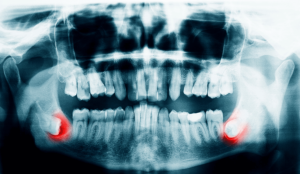 Part of growing up is getting your wisdom teeth, and for many people, so is having them removed. Whether you are younger or older, if you need to have your wisdom teeth removed, here’s what you need to know.
Part of growing up is getting your wisdom teeth, and for many people, so is having them removed. Whether you are younger or older, if you need to have your wisdom teeth removed, here’s what you need to know.
What are wisdom teeth?
Wisdom teeth are your third set of molars. They grow in the very back of your mouth, usually when you are between 17 and 25 years old. Because these teeth grow in so much later than your other permanent teeth, they are called wisdom teeth.
Why do I need to have them removed?
Problems may occur when your wisdom teeth begin to break through the skin. Many people have a jaw that is too small to accommodate four more teeth, and their wisdom teeth may grow in at an unusual angle that presses on surrounding teeth. It may also be difficult to keep the wisdom teeth clean because it’s hard to reach them when brushing and flossing, which can lead to cavities and bone loss. In some cases, the wisdom teeth can’t completely break through the skin and remain beneath the skin surface–what your dentist may refer to as impacted.
When wisdom teeth do not grow correctly, they need to be removed.
What happens during a wisdom tooth extraction?
Sometimes wisdom teeth extractions will be referred to an oral surgeon depending on surgical or sedation requirements.
Prior to surgery
You will meet with the dentist, he or she will explain the procedure and you may ask any questions you have.
During surgery
You may choose to be awake during the extraction and take medication so that your mouth is numb and you feel no pain. Or you may decide to be sedated–given medication so that you are in a sleep-like state and do not feel pain as your wisdom teeth are removed.
The nature of your extraction surgery will depend on the way your teeth are growing in. The dentist may need to cut your gum, remove small pieces of bone or divide the tooth into smaller sections to make it easier to remove. Once the tooth has been extracted, the surgeon will place stitches in your gum to help it heal.
After surgery
You will need a ride home following surgery. You may feel drowsy and have mild pain or discomfort, for which your dentist may prescribe pain medication. Your dentist will give you detailed instructions for caring for your mouth and gums while they heal.
Post-surgery instructions:
- Apply ice to your face and jaw to help reduce swelling
- Apply moist heat to your jaw to help relieve muscle discomfort
- Take pain medication as prescribed by your dentist
- Drink plenty of liquids
- DO NOT drink from a straw because you may dislodge blood clots in your gums that you need to heal faster
- Eat soft foods
- Avoid sticky, hard or crunchy foods for the first few days
- Exercise your jaw by gently opening and closing it often
- Brush your teeth on the second day
- Rinse your mouth, very gently
- DO NOT swish or spit too roughly
- DO NOT smoke because it may delay your healing
When to call the dentist
Call your dentist or oral surgeon immediately if you have unusual bleeding, a fever or severe pain that is not managed with recommended pain medication. Call your dentist (or surgeon) if you think you have gotten food inside the space where your wisdom tooth was or if that socket feels or looks empty.

